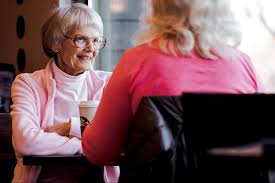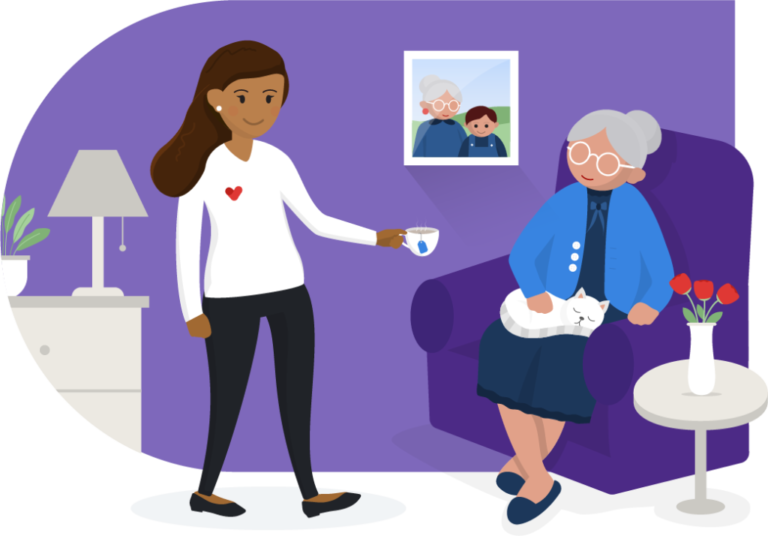
When planning for senior care, understanding the difference between independent living vs assisted living is crucial. While both options provide safe...

Deciding when the time is right for your loved one to move to assisted living can be difficult.
You’ll have many questions, such as what does an assisted living actually do, or will my loved one be well cared for?
The good news is no matter what the questions, there are senior care professionals to help you find the right fit for your loved ones’ needs.
Assisted living facilities are non-medical, group living environments that provide seniors not only amenities like meals, activities and transportation, but that provide several levels of care in a neighborhood of seniors in similar stages of life.
In assisted living, emotional needs can be met as well as physical needs.
As seniors age, it may become more difficult for them to perform household tasks. They might get tired more quickly, and moving around could be painful. If you notice your loved one can’t perform tasks like bathing, dressing, shopping, or making meals, it may be time for assisted living.
In many of these situations family members step in and care for elderly loved ones, but this can put a strain on even the most loving relationships. Be sure to think about what is best for both you and your loved one. The mental and physical health of a caregiver is also important.
In addition to emotional challenges, your loved one may begin to need more physical care. When a senior needs help to move from place to place or get up and down from a chair, bed or commode, it may be time for professionals in assisted living to take over. Risking a fall is a very real danger.
Cooking and meal preparation is one of the first tasks that gets ignored as seniors age. Fast food and prepackaged meals can lead to malnutrition, regardless of the amount of food eaten. In assisted living seniors get more well-balanced, healthy meals. And eating more nutrient-rich foods can improve not just their physical health, but give them a renewed positive outlook.
Unfortunately, depression is common in older adults. And depression and overwhelming sadness can lead to poor health outcomes. Assisted living communities offer lots of activities to help seniors get engaged in life again. Making new friends is also a benefit.
Medication mismanagement is one of the main reasons seniors move to assisted living. A majority of elderly take 3-5 medications daily, and confusing them or forgetting them can have serious consequences.
All assisted living facilities have medication technicians on staff who can manage your loved one’s medications. They will give them out on the right days, at the right times, and in the right amounts, and they’ll make sure no medications are missed.
Falls are a huge risk for seniors and they are very common. If a senior falls and they are alone, they could spend hours or even days on the ground. And falls can have serious consequences, such as broken bones or head injuries that mean an emergency room visit, hospitalization, and possible surgery. If your loved one is prone to falls, a medical alert is helpful as long as they’ll actually use it! A better solution after repeated falls is to move your loved one to a small assisted living facility or board and care home.
As seniors age they may isolate themselves, resulting in further sadness and depression. They may lose interest in life. They may have pain. They may feel unworthy of companionship. They may be so used to being alone that the thought of being social again is overwhelming. Assisted living communities can help draw seniors out of their isolation, even though it may take time.
When family members don’t live nearby, it’s often a close neighbor or friend who notices the subtle changes in a senior. They may appear more forgetful. They may leave their home and become confused. They may not have food in their refrigerator. They may wear clothes that are not clean. They may not take care of their own hygiene.
These are all valid warning signs that a senior needs care, and many times assisted living is the answer.
If you have a hired caregiver taking care of your loved one, and they let you know the care is even too difficult for them to manage, it’s time to consider assisted living. You may also notice your hired caregiver struggling in certain situations, even though they don’t say anything.
This is one of the easiest and best ways of making a move to assisted living – when your loved one agrees it’s time.
Health issues of old age such as dementia, Alzheimer’s, or Parkinson’s’ may become difficult for family members to manage.
If your loved one has health complications that require a high level of care, an assisted living facility with trained staff is a good option to make sure your loved one is getting the proper care they need.
Making sure your loved one gets the care and attention they need to stay healthy and happy is vital. It can be very stressful to find the right assisted living community or home. An elder care placement service can provide valuable help.
Here at Elder Answers, we have helped hundreds of families find the right care community or home for their loved ones. If you are experiencing any of the things written about here, please contact us to help your family find the right assisted living for your loved one.

When planning for senior care, understanding the difference between independent living vs assisted living is crucial. While both options provide safe...

As our parents age, many of us begin to consider how we can best support them in their senior...

In 2025, the cost of in-home care continues to be a critical factor for families seeking senior caregiving services....

As our loved ones age, their care needs often change, and navigating the world of senior care facilities can...